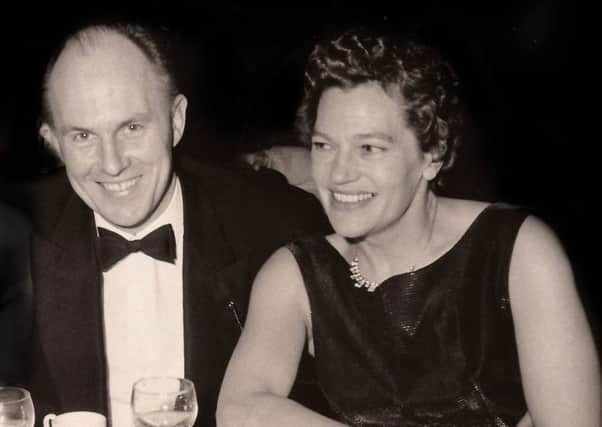Obituary: Dr Donald Macdonald, general practitioner


Born in Dumbarton, Donald Macdonald was the son of a Lewisman (unsurprisingly also Donald Macdonald) and Mary Kellock from Lower Largo in Fife. Schooled with his beloved brother David at Dunoon Grammar (where Donald senior also taught), he had many fond memories of his home town, but perhaps more glowing ones of holidays in his mother’s home in the East Neuk – “the Scottish Riviera” – and very probably the train journeys there and back since he was a lifelong lover of steam.
Donald studied medicine at Glasgow University in the early years of the war and one of his most vivid memories was of the Clydebank Blitz and of walking to morning lectures through streets littered with debris and broken glass. It was an image of the fragility of humanity that endured.
Advertisement
Hide AdAdvertisement
Hide AdWhile later conscious that the war had been relatively kind to him – he missed D-Day by a whisker and was posted instead to Egypt – his three-and-a-half years in the Middle East were certainly eventful and, at times, gruelling enough.
This included more than a year in Cyprus devoted to the unequal struggle to maintain the health and engage the trust of a growing stream of traumatised Jewish emigrants in a squalid transit camp in Famagusta.
In contrast, he was subsequently appointed Embarkation Medical Officer in Port Said, involving, among other duties, “playing nursemaid to an assortment of arriving colonels, brigadiers and even generals”.
While in the Middle East, he met May Florence Mott (Warrant Officer) who had arrived there after a lively career with the ack-ack batteries on Foulness Island. They married on 19 July, 1947, returning to Cyprus for a brief but idyllic honeymoon.
Six years (and three children) later, Donald and May were in Methil where, as general practitioner, he gave committed and fondly remembered service to the people of Methil and Buckhaven throughout the bulk of the 1950s and 60s. An irony of this, in the early years, was that his house calls would include the Wemyss family, erstwhile proprietors of a large part of the Fife coal industry, and David Proudfoot, a mining union activist and stalwart of “Red Scotland” in the 1920s and 30s.
Visits to “Davie”, by this time bed-ridden, were – after the professional formalities – usually an occasion for lively and often prolonged political debate – something probably not encouraged at Wemyss Castle.
While in the Middle East, Donald had been appalled by the news of the Hiroshima and Nagasaki bombs. This, coupled with a loathing of war generally and an instinctive internationalism, led him (and May) to devote much of their small stock of free time to organising and campaigning for CND and the United Nations Association (UNA).
Meetings were, however, not necessarily intense, humourless affairs for Donald was an irrepressible performer – with a fine voice and an anarchic sense of fun – who could slip from Sinatra to Rikki Fulton in seconds.
Advertisement
Hide AdAdvertisement
Hide AdStunned attendees at UNA “International Nights” could find themselves addressed by unexpected guests of honour – Churchill perhaps or Khrushchev or even Castro (complete with false beard and cigar).
It was an irreverent approach which could prove a little less welcome at Burns Suppers, but seemed to do his standing no harm in the UNA as he was ultimately to receive the not entirely welcome elevation to chairman of the association in Scotland.
He was uncomfortable with this and attributed it to a probable lack of competition – but may have been also as quietly gratified as he had been by his brief war-time exaltation to SMOLEM (Senior Medical Officer Levant and the Eastern Mediterranean).
In retrospect, his energy (for someone who often accused himself of laziness) was extraordinary. A devoted theatre lover, his weekly duties (midnight call-outs notwithstanding) could be punctuated by a visit with May to the Perth Rep, a review being written on return and delivered to the East Fife Mail before morning surgery.
A pre-school child might require collection from Buckhaven Nursery to accompany him on his afternoon rounds – occasionally even into the patient’s home. (Hence my awareness of the Macdonald-Proudfoot dialogues – I was there, though at four years old, a less than attentive witness.) And on Sundays, long links walks from Leven to Largo where his Aunt Isa still lived in the Kellock home were a regular fixture – despite our protestations.
In 1968, Donald accepted the post of medical officer and principal lecturer in Health Education at Jordanhill College – as he said himself “masquerading as a teacher” while revelling in each “captive audience” the remit provided.
Retiring early, he and May returned to Fife – indeed to Lower Largo – and to the innumerable friends they had in the area. Not that Donald was ever likely to have lost touch, having a talent for friendship and a restless pen – his correspondence was copious for most of his life.
And “Sebastian” (his reviewing pen-name) took to the press again, submitting copy to the East Fife Mail the The Scotsman and others well into his ninth decade.
Advertisement
Hide AdAdvertisement
Hide AdAlthough May lived long enough to see all her grandchildren, Donald survived her by nearly 20 years. At the last, he would frequently declare that he wasn’t afraid of dying – though none of his children (Anne Marie, John and Norman) could ever have been philosophical at the prospect of losing him.
And however many of his correspondents he had outlived, he could never have outlived friends, because he never stopped making them.